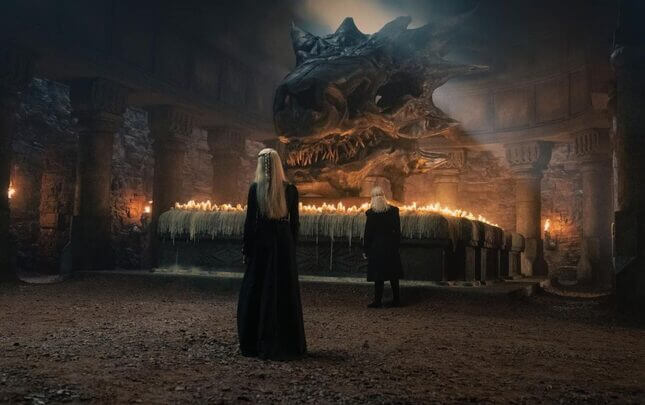‘House of the Dragon’ Forced Birth Scene Hit Too Close to Home
We were promised a show without Game of Thrones' explicit on-screen violence against women, but that really depends on how you define it.
EntertainmentTV

The fantastical, dragon-filled world of Game of Thrones is back with HBO’s prequel series House of the Dragon—and so is its uncomfortable, all-too-real spectacle of on-screen gendered violence.
In the relatively slow-paced yet eventful premiere, the show focuses on the Targaryen dynasty (Daenerys Targaryen and Jon Snow’s ancestors) 200 years before the events of GoT. King Viserys, without a male heir, hopes his pregnant wife Aemma will birth a healthy son; instead, when the delivery is afflicted with gruesome complications and Viserys must essentially choose between saving Aemma’s life or the male baby’s, he predictably chooses his son. What ensues is a bloody, utterly horrifying scene of Aemma screaming, bleeding, and restrained as she dies giving birth to a baby that will also die within a day.
The episode ends with Viserys naming his young, dragon-riding and generally badass daughter Rhaenyra as his heir (notably, only after Viserys’ brother Daemon royally fumbles by publicly celebrating his nephew’s death)—this is a big deal as no queen has ever reigned before in this entirely fictionalized yet, still, somehow historically misogynist land. Despite this, it’s difficult if not impossible to bask in the feminism of this outcome, when mere minutes ago we watched Rhaenerys’ mother physically torn apart for the mere prospect of a male heir. House of the Dragon writers have previously offered interesting commentary on how the show will depict—and not depict—sexual and gender-based violence, confirming that it won’t include rape scenes but will explore patriarchal oppression in other forms. Nonetheless, the violent forced birth scene was frustrating to watch in our post-Roe v. Wade political and cultural context. Forced birth, pregnancy complications without medical help, and the prioritization of unborn, hypothetical life over a pregnant people’s health and safety may not be the same as a traditional rape scene, but it has a similarly traumatic effect to witness—especially right now.
-

-

-

-

-

-

-

-

-

-

-

-

-

-

-

-

-

-

-

-

-

-

-

-

-

-

-

-

-

-

-

-

-

-

-

-

-

-

-

-








































